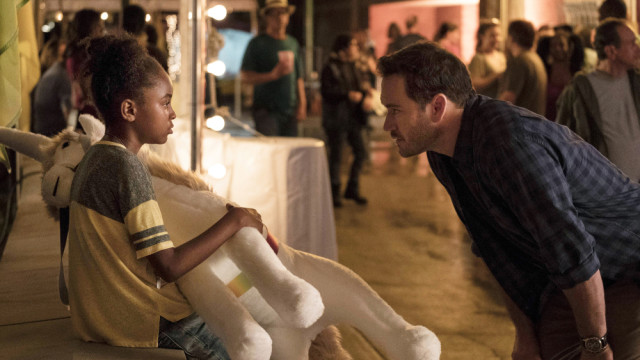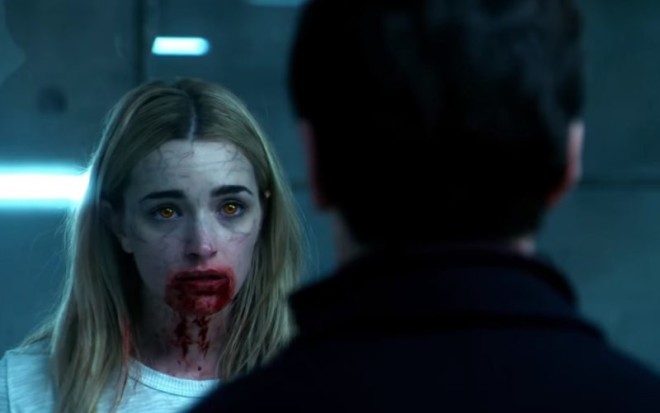Genre: Drama/Supernatural (TV Pilot)
Premise: Working on a top secret project to eliminate sickness and aging, the US Defense Department inadvertently creates vampires.
About: Today’s novel, “The Passage,” was adapted into a pilot by Liz Heldens, whose paid her writing dues by working as a staff writer for over a decade. She’s also created a couple of shows that didn’t make it to a second season, “Camp,” and “Deception.” Don’t let that fool you. Creating a show that stays on the air is the chupacabra of this business. It’s so hard to do, especially when you’re writing for a network. They’ll execute a top-rated show if they think it’ll help lunch get there faster. Stephen King called The Passage books “a trilogy that will stand as one of the great achievements in American fantasy fiction.” The pilot debuts this fall on Fox.
Writer: Liz Heldens (based on The Passage trilogy by Justin Cronin)
Details: 49 pages – Shooting draft
I looked at the title page of The Passage and saw a list of drafts off to the side (Production Draft, Blue Draft, Pink Pages, Green Pages, Goldenrod Pages, 2nd Blue Pages, Reshoot Pages, Revised Reshoot Pages). And let’s not forget however many drafts were written before the production draft.
Heldens probably needed a second computer just for all the notes she received on this project. I bring that up because yesterday I reviewed a movie from Netflix, How it Ends, whose notoriously hands-off approach led to zero notes.
Which begs the age old question about development: Is studio interference good or bad?
We love hearing quotes from directors of successful films such as: “We were so small they just left us alone.” The implication being that execs and producers are the real problem. If they’d just leave us artists alone, we’d all be painting the Mona Lisa.
But then how do you explain movies like How it Ends? If they had someone looking at those dreadfully boring dailies, they might’ve been able to come in actually save that film. Or at last try.
On the flip side of this you get network TV pilots like today’s, which are notes’d to death. Which is better? I don’t know. But maybe today’s pilot may get us a little closer to the answer.
Dr. Jonas Lear is with a team in the jungles of Bolivia searching for a legend – the 250 year old man. When he finds him, the man turns out to be a monster, leaping onto fellow doctor Tim Fanning and biting into his neck. Fanning survives, and after they take him to the hospital, he’s miraculously healed.
Cut to three years later and we’ve got Project Noah, a secret military operation where they take murderers on death row and experiment on them with medicine created from the blood of Fanning. Oh, Fanning’s still around, by the way. He’s being held in a cell due to the fact that he’s NOW A VAMPIRE MONSTER.
Running the lab is Major Nichole Sykes. When a Chinese outbreak of avian flu threatens to wipe out 15% of the world’s population, Sykes has to make a tough choice about Project Noah – which has the potential to save those 15%. Her scientists believe that the only way to come up with medicine that doesn’t turn its hosts into monsters, is to experiment on a child.
So Sykes finds a 10 year old orphan, Amy, and orders local agent Brad Wolgast to pick her up. Agent Wolgast, who lost his own daughter a few years ago, takes a liking to Amy. Sensing that a life in their lab will lead to years of pain, he decides to kidnap her and make a run for it. It doesn’t take long for the government to find out. And when they do, they put their entire might behind finding Wolgast and retrieving that girl.
Let me preface this by saying I haven’t read this novel. So I don’t know if this problem is addressed in it. But how is it that the story is built around retrieving a girl who has no special value whatsoever? She doesn’t have superpowers. She can’t see the future. She’s not injected with the virus. Her power is that she’s an orphan.
I think they’re implying that Amy could expose their secret and that’s why they have to find her. But she doesn’t know their secret. She doesn’t know anything about the experiments at this point. And, for that matter, neither does Wolgast. He’s making a guess that bad stuff happens in the lab but he’s never been there himself.
So half this show is about running after a girl who holds no special value at all? That’s strange.
Especially when you consider that they have a fun idea back at the lab. You have these weird variations on vampires that could escape at any second and then wreak havoc on the world. Vampires as far as the eye can see. Why not just stick with that?
I suspect this has to do with the A, B and C storyline TV formula. You have your A story, the Noah Project. The B story becomes finding the girl. And the C story is something else. I understand wanting to stick with this formula. TV is built with more characters, more plotlines, and therefore more jumping around. But you shouldn’t create storylines to meet quotas if they don’t work. No B story is better than a bad B story, right?
More concerning is how written everything feels here. Things were happening because the writer needed them to, not because they would really happen. Take, for example, the fact that Wolgast and his partner, Doyle, spot a carnival on the side of the road after picking up Amy for a military transfer. Amy points out the ferris wheel and, out of nowhere, Wolgast says, let’s stop there! So the three of them just stop at a carnival for an hour.
This makes zero sense. No professional agent on a mission for the government would do this. Especially since Wolgast hadn’t connected with Amy yet. It’s the writer making something happen so that Wolgast and Amy can become closer. I don’t know why so many writers continue to make this mistake. All you have to do to stop it is ask yourself, “Would it really happen this way?” If it wouldn’t, it means you’re cheating. Which means you need to move things around – do the hard work that most writers don’t want to do – to make the decision believable.
I would place The Passage at the other end of the development spectrum from How it Ends. It feels over-managed. Which is too bad because somewhere at the core of this show is a cool idea. If they got rid of this girl and focused on the vampires, they could have something.
[ ] What the hell did I just read?
[x] wasn’t for me
[ ] worth the read
[ ] impressive
[ ] genius
What I learned: Sometimes you have to be on the nose in TV writing. When Wolgast calls his ex-wife during the kidnapping, they must speak covertly, as there’s an agent in the room with her. Here’s how that’s described:
“Their voices are low and there’s an intimacy to the coded conversation that’s almost sexy. Despite everything, Wolgast gives a small smile for his cool-under-pressure Lila — despite everything, he is overcome with longing for her.”
This is VERY on-the-nose. I wouldn’t recommend ever writing a line like it in a spec. If you’re doing your job, the reader should be able to pick up on this themselves. However, when you’re dealing with multiple executives, as well as directors and other creatives, I’ve learned that sometimes a writer has to go against their instincts and be VERY ON THE NOSE about certain beats to make sure the direction is understood. You don’t have to worry about this as an amateur. But when you get into the game, you’ll sometimes have to write lines like this, unfortunately.



